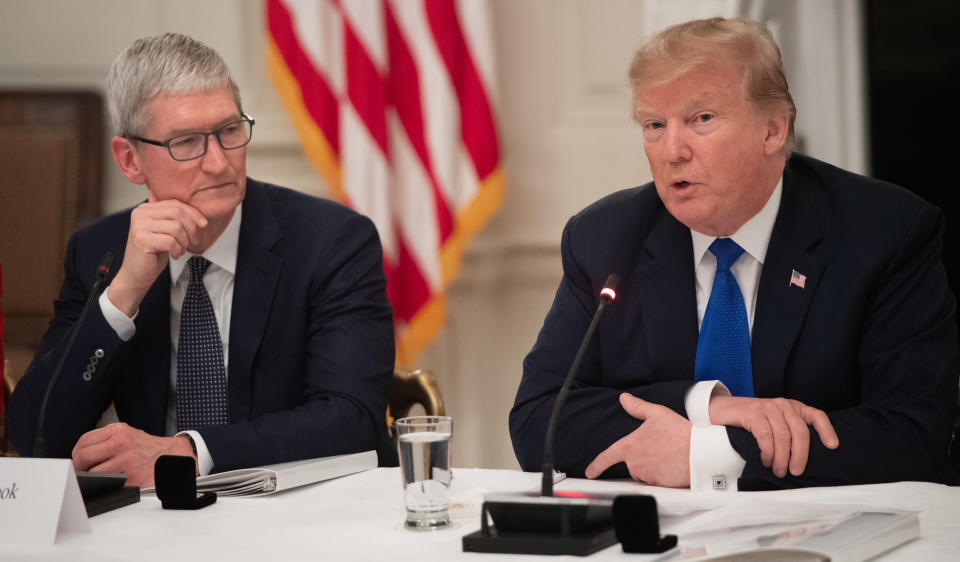Trump's China tariffs couldn’t come at a worse time for Apple
President Donald Trump on Thursday said Friday he is considering levying a 10% tariff on $300 billion in Chinese-made goods imported to the U.S., including smartphones. That's bad news for Apple (AAPL), which is already dealing with stagnant iPhone growth.
A tariff on iPhones could go one of two ways that would hurt the company. The first is that Apple could swallow the increased cost of its top revenue-generating product, or it could pass the price onto consumers, which would increase prices on iPhones by as much as $75 to $100. That, in turn, would cut demand by millions of units.

Either way, the tariffs, which are expected to go into effect in September, are an unwanted headache for Apple, which is expected to launch new iPhone models that same month.
Trump's tariffs
Trump threatened a new round of tariffs on Thursday via a tweet following failed trade talks between the U.S. and China. The new tariffs would be in addition to existing 25% tariffs on $250 billion in Chinese-made goods.
According to Trump, the new tariffs would go into effect on Sept. 1. Apple typically debuts its latest version of the iPhone in early September, and puts them on sale later in the month. This year's crop of iPhones, though rumored to offer improvements, aren't expected to result in an upgrade supercycle that sees a massive boost in sales.
That's because the company is said to be prepping a 5G version of its smartphone for 2020, and with people holding onto their phones for upwards of four years, it would make more sense for consumers to hold off until 2020 to get a 5G-capable iPhone they'll keep for years.
...during the talks the U.S. will start, on September 1st, putting a small additional Tariff of 10% on the remaining 300 Billion Dollars of goods and products coming from China into our Country. This does not include the 250 Billion Dollars already Tariffed at 25%...
— Donald J. Trump (@realDonaldTrump) August 1, 2019
If the tariffs go into effect as planned, Apple could also see a hit to its bottom line. According to Bank of America Merrill Lynch analyst Wamsi Mohan, Apple's earnings per share could take a beating of $0.50 to $0.75 per year.
Should Apple pass the 10% price increase from the tariffs on to consumers, Mohan said the company could see a 20% decrease in iPhone demand, translating to roughly 10 million iPhones.
Wedbush Securities analyst Dan Ives, meanwhile, estimates that fiscal year 2020 earnings per share could take a 4% hit if Apple chooses to eat the 10% price increase on its own. Passing on the increase to consumers, he explains in his analyst note, could cut into iPhone demand to the tune of 6 million to 8 million units.
Of course, the new 10% tariff isn't the only one Apple has to contend with. The company also recently learned that its Mac Pro desktop won't be exempt from 25% tariffs on Chinese-made goods shipped to the U.S.
Despite these pressures, both Ives and Mohan see the issue as manageable for Apple.
Production won't move overnight
The biggest issue for Apple, and other consumer goods companies, is that moving production from China to areas clear of Trump's tariffs takes time.
"From a supply chain perspective we believe Apple would only be able to move 5% to 7% of iPhone production to India/Vietnam over the 18 to 24 months if the China tariff situation spirals down a more negative and nasty path," Ives wrote in an analyst note.
Apple's chief production partner Foxconn, however, has said it can move the company's iPhone production to other regions if need be. According to Bloomberg, Foxconn founder Terry Gou suggested that Apple invest in Taiwan as a potential production hub for its products.
Apple's sole product built in the U.S. was Mac Pro, though the company moved production of the desktop to China after a series of difficulties in U.S. production. After rejecting Apple's appeal for a waiver to the China tariffs on the Pro, Trump tweeted that if they were built in the U.S., they wouldn't face any tariffs.
Building an iPhone in the U.S., meanwhile, is unlikely as labor costs would cause the price of the smartphone to skyrocket, putting a serious strain on the company.
More from Dan:
What is Project JEDI? The $10 billion program Trump is holding up
Facebook beats Q2 expectations, says FTC has opened an antitrust investigation
Email Daniel Howley at [email protected]; follow him on Twitter at @DanielHowley.
Follow Yahoo Finance on Twitter, Facebook, Instagram, Flipboard, SmartNews, LinkedIn,YouTube, and reddit.
